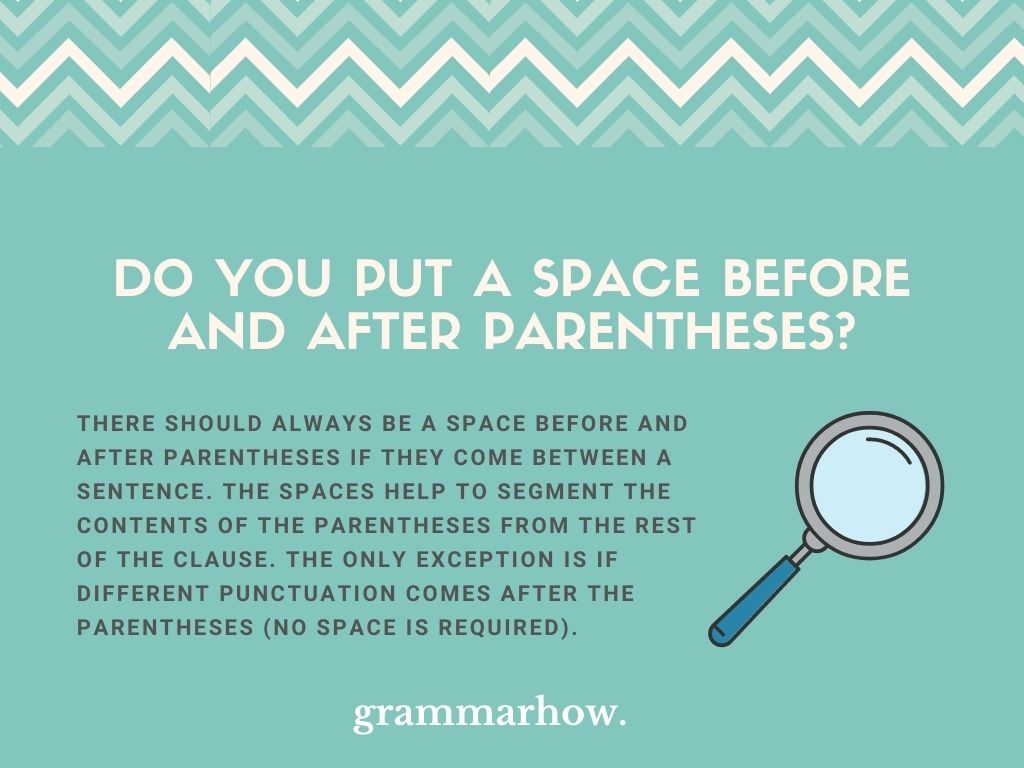Once you’ve got your head around most punctuation rules, you’ll be able to start writing fluent sentences that make perfect sense. This article will explain all you need to know about punctuating parentheses. You will need to know where the space is supposed to go (before and after them).
Do You Put a Space Before and After Parentheses?
There should always be a space before and after parentheses if they come between a sentence. The spaces help to segment the contents of the parentheses from the rest of the clause. The only exception is if different punctuation comes after the parentheses (no space is required).

You can also refer to this example to show you how to use the spaces:
- The internet (which has taught us a lot) claims that there are some things that need to be changed here.
As you can see, the parentheses have spaces on either side of them because they are inserted directly into a sentence.
You might find that the space after the parentheses is dropped, but this only applies if a different punctuation form (like a comma) comes after the parentheses.
- According to his words (which I trust), we should be coming up to the rendezvous point shortly.
Here, a comma comes after the end parenthesis. This stops the need for a space to be added.
Do You Put a Space Before Parentheses?
You should always place a space before parentheses. You need to include the space because it helps to separate the contents of the parentheses from the rest of the clause. You will never find a grammatical case where the comma is dropped.
It all comes down to readability. The best practice is to always include a space before your parentheses. This ensures that whoever is reading your work will always know what you’re saying and how you’re saying it.
There won’t be room for confusion because you haven’t included parentheses without a space.
- I didn’t think about it (even though I knew I needed to).
- I thought you could have changed (though, I guess that was too much to ask).
- The people (who needed the most help) left earlier on in the day. I’m glad that they were okay.
- There are many things (like lamps and sofas) that could be changed in this store. They’re so ugly.
- I want to be there for him (like his father was before him), but I don’t know if I have the courage.
- Whatever they said about me is false (at least, that’s what I’m going to tell him).
- You could have had anything (except that), but you chose to be foolish.
Do You Put a Space After Parentheses?
You should place a space after parentheses when they are inserted into a sentence or clause. If no other punctuation comes after the closing parenthesis, you can simply put a space there to show that it continues on with the rest of the sentence.
Without a space, you’ll end up including a word straight after the parentheses. This looks very jarring, and most native speakers will see it as a typo. Here’s how it might look:
- Incorrect: The people (who I care for)wanted more.
As you can see, “for” and “wanted” almost seem to fuse into one word. This is not appropriate in written cases.
- The internet (which is a fountain of knowledge) has taught me all I know about these types of things.
- Camping (which is my second-favorite holiday idea) is going to have to take a backseat while we care for her.
- The money (which seems to have gone missing) will have to be returned by the end of the day.
- My mother (who loves me dearly) told me that I would never amount to anything. That was rude.
- I thought about it, and I couldn’t be there (even if I wanted to) because of this problem.
- The problem (if you’ll indulge me) is that you don’t care enough.
- The issues you’re facing (which are few and far between) are nothing like the ones they have to handle.
Final Thoughts
You should always surround parentheses with spaces. You should include one before in all cases. One should also come after if you are inserting the parenthetical clause into another sentence. If other punctuation comes after the parentheses, you do not need a space.
You may also like:
Question Mark Inside or Outside Parentheses? (Examples)
Comma Before Or After Parentheses? Explained For Beginners

Martin holds a Master’s degree in Finance and International Business. He has six years of experience in professional communication with clients, executives, and colleagues. Furthermore, he has teaching experience from Aarhus University. Martin has been featured as an expert in communication and teaching on Forbes and Shopify. Read more about Martin here.
